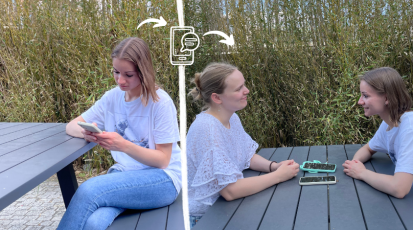The Hidden Side of Erasmus: a Lonely Story

You're doing an Erasmus program? Great, you'll meet new people. You'll be free to enjoy yourself, go out and travel. That's what our student, whom we’ll call Lola, heard in the months leading up to her departure. That's what she expected. But the reality was quite different.
When you think of Erasmus or a semester studying abroad, the image that comes to mind is appealing: discovering a new country and immersing yourself in a new culture. The atmosphere is both festive and academic.
But behind these clichés lies a very different reality. That reality is the unexpected loneliness that some students feel. It's a loneliness that is sometimes oppressive, sometimes hidden. This was the case for our student, currently on Erasmus in Germany at the Hochschule der Medien. Wishing to remain anonymous, we'll refer to her as Lola for the rest of this article.
Lola says: "I was so excited at the idea of going away. Spending a semester studying abroad is a once-in-a-lifetime opportunity at my school. I couldn't wait to discover a new country and new people. Everything felt thrilling and full of promise. Like Lola, many students share these high hopes for their Erasmus experience.
From dream to disillusionment in seconds
The beginnings keep their promises: parties, student cafés, city tours... Lola soon finds a group of friends. She feels comfortable and ready to take on the challenge: living a university experience outside her own country. But things soon change and reality becomes more complex. "I started to feel lonely. Constant socializing can be draining — it demands a high social battery. Even when I was surrounded by people, I felt alone. We all knew each other, without knowing each other personally."
More stories on loneliness and connection from an international perspective can be found by following this link!
A shared loneliness
Lola's case is unfortunately not unique. Many students feel the same sense of loneliness in such a particular context.
A 2023 survey conducted by the Erasmus Student Network (ESN survey) questioned a panel of 20,000 international students. The results showed that more than one in two students suffered from loneliness during their experience. Another study by Erasmus University put the figure at 58%.
This phenomenon is not due to a lack of social contacts. On the contrary, you'll usually find yourself surrounded by students going through the same journey. No, it's more a question of he depth of the relationships formed in a short time with people who are essentially strangers.
When you arrive in a new country, you're looking for your bearings. You look for people, places and habits that reassure you and make you think that everything will be all right. Soon enough, you're talking to lots of people. But how deep are these discussions? Can we confide in people we may never see again? Do we have to pretend to enjoy a moment of sharing to feel included?
All these questions reveal the pressure these Erasmus students are under. The pressure to succeed, the fear of being alone. That's the loneliness these young people face. Lola can testify to this. "At one point, I wasn't feeling very well and needed to talk to someone. I started talking to one of the friends I'd met here. But I soon realized that I was confiding in a stranger, someone who probably had other things on their mind than listening to me vent. So I shut myself off."
This feeling is not uncommon. According to an analysis conducted as part of the BBC Loneliness Experiment, over 60% of students surveyed say they feel lonely despite an active social life. The study identifies the main cause as the difficulty of creating deep, sincere relationships.
How can we resolve or improve this feeling of loneliness ?
The first step to improving this situation is to change our vision of Erasmus. Let's stop thinking that all students who go abroad for a semester feel good. Let's question them. Let's pay attention to those who travel while studying. Lola herself says: "My friends who stayed in my country were all jealous, they envied me. I didn't dare tell my friends that I felt sad." By changing this perfect vision of Erasmus, we may be opening up the dialogue to those who feel alone. It's essential to create a more realistic speech. This doesn't mean we have to destroy the image of this experience, which remains unforgettable. Let's just make it more honest and realistic, so that those who want to leave can be better prepared for the unexpected risks. Let's allow them to talk about it, because normalizing emotions should be a strength.
And our student agrees: "I would have felt more comfortable if I'd heard from other students who felt the same way. I discovered a podcast by a girl who was just starting out in a long-distance relationship and felt very alone as a result. It's really good to have someone else's opinion."
So the first step is talking. The second is creating bonds, offering opportunities to share real moments. These occasions should open the door to deeper exchanges, even if they're only for a short time. One of the best ways to do this is to take part in organized events such as those organized by the Erasmus Student Network (ESN). This organization plays a key role in the integration of international students. Present in over forty countries, it offers a wide range of activities. Far more than just parties with alcohol, ESN offers convivial moments adapted to different profiles, such as language exchanges, karaoke, photo workshops or cake decorating.
Beyond ESN's international scope, local associations may also be available. Sporting, cultural, wellness or artistic, for example, they offer a new way to feel supported. It's time to share moments that are perhaps more in phase with who we are, with regular meetings.
Lola also tells about a solution she experienced here at the Hochschule der Medien. Before she arrived, she was put in touch with her buddy. A German student who would welcome her and introduce her to the school. "It was a relief. I knew that when I arrived, someone would be there to help me with the school and, above all, the German administration!” This “sponsor” system is a real way of forging emotional links quickly and feeling less alone.
Go even further
But there are many other solutions to consider. Dear students, dear host establishments, let's be careful of those around us. Let's not think that going out and partying is the goal of everyone who arrives in a new country. Let's help students who feel lonely to get into perspective, to feel surrounded.
Going abroad also means learning to live with your emotions and your limits. Behind the enthusiastic stories, there is a more nuanced reality that deserves to be heard. For it is by accepting this complexity that the Erasmus experience can become truly enriching.








